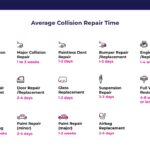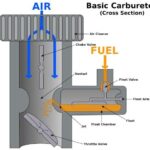Finding yourself in your car, ready to go, only to be overwhelmed by the distinct smell of gasoline can be alarming. Immediately, questions and worries probably flood your mind – is it dangerous? Is something broken? If you’ve ever typed “Why Does It Smell Like Gas In My Car” into a search engine, you’re not alone.
From something as simple as a loose gas cap to more complex issues within your fuel pressure regulator, understanding your vehicle’s fuel system is the first step in diagnosing that unwelcome gas odor. Let’s explore the journey of fuel in your car and pinpoint potential reasons behind that gasoline smell.
Understanding Your Car’s Fuel System
To effectively figure out why you smell gas in your car, it’s helpful to have a basic grasp of your fuel system. Here’s a simplified overview of how fuel travels in a typical gasoline-powered vehicle:
- Fuel Tank: This is where the fuel storage begins. Usually located at the rear, the gas tank is simply a secure container for your gasoline.
- Fuel Pump: When you start your car or turn the ignition to “on,” the fuel pump engages. In modern cars, this electric pump, often inside the fuel tank, starts drawing fuel and pressurizing the fuel lines.
- Fuel Filter: After exiting the tank, the fuel passes through a filter. This crucial component removes impurities, ensuring clean fuel flows to the engine.
- Fuel Lines and Hoses: Clean fuel then travels from the back to the engine at the front through a network of robust metal lines and flexible, corrosion-resistant hoses.
- Fuel Rail(s): Once at the engine, the fuel is distributed to the fuel injectors via fuel rails, which are essentially metal distribution pipes.
- Fuel Injectors: Most modern vehicles use fuel injectors for each cylinder. These injectors precisely spray the correct amount of fuel into the cylinder to mix with air for combustion.
Fuel Leaks: A Serious Reason for Gas Smell
One of the most common – and most concerning – reasons for smelling gasoline in your car is a fuel leak. Any part of the fuel system, especially fuel lines and hoses, can develop leaks over time due to corrosion, wear, or physical damage from road debris.
It’s not always just age and wear that cause leaks. Modern vehicles use a fuel pressure regulator to maintain the correct pressure in the fuel system. If this regulator fails, it can cause pressure issues that lead to leaks.
Fuel leaks are a serious safety hazard and should never be ignored. Fuel spraying onto a hot engine or exhaust system can easily ignite, causing a car fire. Even fuel vapors in an enclosed space like a garage are highly flammable. If you smell gas while driving, it’s crucial to get your vehicle inspected by a professional mechanic as soon as possible. Ignoring a fuel leak puts you and your vehicle at significant risk.
My Car Smells Like Gas But Isn’t Leaking: Other Potential Causes
Sometimes, the reason you smell gas isn’t a major leak. It could be something as simple as a recent fuel up, or it could indicate other issues. If you don’t see puddles of fuel under your car, here are some other possible culprits for that gas smell:
-
Accidental Fuel Spills: It’s easy to spill a little gas when refueling, and even a small amount on your shoes or car mats can create a noticeable odor inside the cabin.
-
Loose or Missing Gas Cap: The gas cap is vital for sealing the fuel system and preventing vapors from escaping. If it’s loose, cross-threaded, or missing altogether, fuel vapors can vent out, causing that gas smell. Always ensure your gas cap is properly tightened after refueling.
-
Fuel Injector Problems: If a fuel injector malfunctions, becoming partially blocked or stuck open, it can cause the engine to run “rich,” meaning it receives too much fuel. A rich fuel mixture results in exhaust fumes that are heavy with unburnt fuel, and these fumes can sometimes enter the car’s cabin. Fuel injector issues can also lead to poor engine performance and damage to the catalytic converter, so addressing them promptly is important.
-
Evaporative Emission (EVAP) System Issues: Modern cars have an EVAP system to trap fuel vapors and prevent them from being released into the atmosphere. This system can develop leaks or malfunctions. If the EVAP system isn’t working correctly, you might smell gas, especially around the car’s exterior or sometimes inside. Often, an EVAP system problem will trigger the check engine light on your dashboard.
-
Faulty Charcoal Canister: Part of the EVAP system, the charcoal canister absorbs and stores fuel vapors. If the canister is damaged or saturated, it may not effectively trap vapors, leading to a gas smell, potentially inside the car.
Breathe Easy Again with Professional Car Care
Regardless of how minor it seems, smelling gasoline inside your car should never be dismissed. It’s important to determine the cause and address it for your safety and your vehicle’s health. If you are experiencing a persistent gas smell, it’s best to consult with qualified technicians. Schedule a check-up with a trusted mechanic to accurately diagnose and fix the reason why you smell gas in your car, ensuring a safer and more pleasant driving experience.

